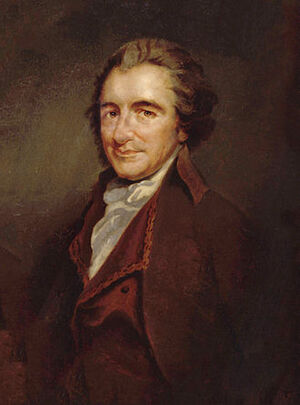Thomas Paine (nonfiction): Difference between revisions
Jump to navigation
Jump to search
(Created page with "'''Thomas Paine''' (or '''Pain'''; February 9, 1737 [O.S. January 29, 1736] – June 8, 1809) was an English-American political activist, philosopher, political theorist, and...") |
No edit summary |
||
| Line 1: | Line 1: | ||
'''Thomas Paine''' (or '''Pain'''; February 9, 1737 [O.S. January 29, 1736] – June 8, 1809) was an English-American political activist, philosopher, political theorist, and revolutionary. | [[File:Thomas Paine.jpg|thumb|Thomas Paine, copy by Auguste Millière, after an engraving by William Sharp, after George Romney, circa 1876 (1792).]]'''Thomas Paine''' (or '''Pain'''; February 9, 1737 [O.S. January 29, 1736] – June 8, 1809) was an English-American political activist, philosopher, political theorist, and revolutionary. | ||
One of the Founding Fathers of the United States, he authored the two most influential pamphlets at the start of the American Revolution, and he inspired the rebels in 1776 to declare independence from Britain. | One of the Founding Fathers of the United States, he authored the two most influential pamphlets at the start of the American Revolution, and he inspired the rebels in 1776 to declare independence from Britain. | ||
| Line 23: | Line 23: | ||
* [https://en.wikipedia.org/wiki/Thomas_Paine Thomas Paine] @ Wikipedia | * [https://en.wikipedia.org/wiki/Thomas_Paine Thomas Paine] @ Wikipedia | ||
[[Category:Nonfiction (nonfiction)]] | [[Category:Nonfiction (nonfiction)]] | ||
[[Category:People (nonfiction)]] | [[Category:People (nonfiction)]] | ||
Revision as of 07:01, 30 December 2016
Thomas Paine (or Pain; February 9, 1737 [O.S. January 29, 1736] – June 8, 1809) was an English-American political activist, philosopher, political theorist, and revolutionary.
One of the Founding Fathers of the United States, he authored the two most influential pamphlets at the start of the American Revolution, and he inspired the rebels in 1776 to declare independence from Britain.
His ideas reflected Enlightenment-era rhetoric of transnational human rights.
He has been called "a corsetmaker by trade, a journalist by profession, and a propagandist by inclination."
In the News
Fiction cross-reference
Nonfiction cross-reference
External links:
- Thomas Paine @ Wikipedia
